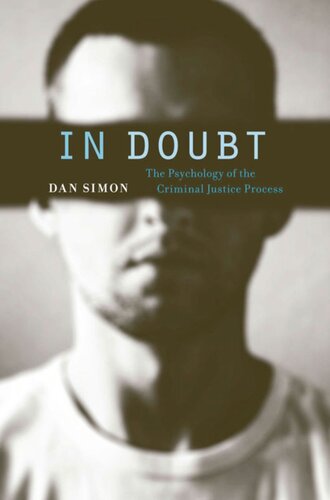

Most ebook files are in PDF format, so you can easily read them using various software such as Foxit Reader or directly on the Google Chrome browser.
Some ebook files are released by publishers in other formats such as .awz, .mobi, .epub, .fb2, etc. You may need to install specific software to read these formats on mobile/PC, such as Calibre.
Please read the tutorial at this link: https://ebookbell.com/faq
We offer FREE conversion to the popular formats you request; however, this may take some time. Therefore, right after payment, please email us, and we will try to provide the service as quickly as possible.
For some exceptional file formats or broken links (if any), please refrain from opening any disputes. Instead, email us first, and we will try to assist within a maximum of 6 hours.
EbookBell Team

4.8
14 reviewsThe criminal justice process is unavoidably human. Police detectives, witnesses, suspects, and victims shape the course of investigations, while prosecutors, defense attorneys, jurors, and judges affect the outcome of adjudication. In this sweeping review of psychological research, Dan Simon shows how flawed investigations can produce erroneous evidence and why well-meaning juries send innocent people to prison and set the guilty free.
The investigator’s task is genuinely difficult and prone to bias. This often leads investigators to draw faulty conclusions, assess suspects’ truthfulness incorrectly, and conduct coercive interrogations that can lead to false confessions. Eyewitnesses’ identification of perpetrators and detailed recollections of criminal events rely on cognitive processes that are often mistaken and can easily be skewed by the investigative procedures used. In the courtroom, jurors and judges are ill-equipped to assess the accuracy of testimony, especially in the face of the heavy-handed rhetoric and strong emotions that crimes arouse.
Simon offers an array of feasible ways to improve the accuracy of criminal investigations and trials. While the limitations of human cognition will always be an obstacle, these reforms can enhance the criminal justice system’s ability to decide correctly whom to release and whom to punish.